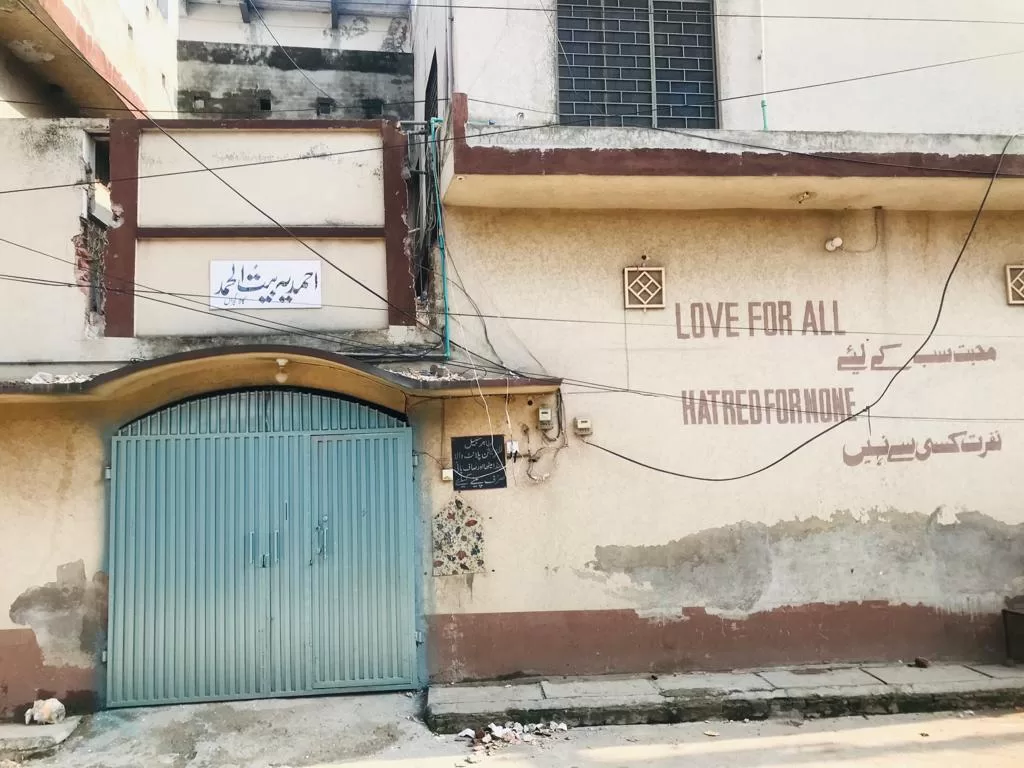“I’ve never felt so humiliated in my life as that night, when I was pushed into a police vehicle and taken to a police lock-up as if I was a criminal,” said 40-year-old Fahim Shaukat, which isn’t his real name.
On the night of 14 July, Shaukat, along with a dozen other men from the Ahmadiyya Muslim community, had gathered inside their place of worship in Kala Gujran, a town in the Jhelum district in the Punjab province of Pakistan, to stop desecration of their building after fears it may be attacked.
“Earlier that day, our community head met with the police with the latter demanding we demolish minarets [towers used for calls to prayer] or the police would be forced to do it themselves by midnight,” Shaukat told Index. “Our amir [religious head] refused and reasoned with him saying there was nothing in the law that barred us from having minarets.”
He recalled what happened that night: “Around 11:30 pm, we heard the doorbell, and at the same time the CCTV placed outside the door was destroyed. I opened the door, and was asked to step outside.”
Other people were hauled out, and Shaukat said there were around 20-25 policemen. He described how some of them went inside to look around, while a bearded man in a light blue shalwar kameez (a Pakistani outfit) took a ladder from one of the police vans and started hammering down the minaret.
While this was happening, men from the Ahmadiyya community were shoved into a police van and taken to the station and interrogated, before being released.
“This was an entirely illegal action, facilitated by the police themselves, and we suspect it was done at the behest of the Tehreek-e-Labbaik Pakistan,” Amir Mahmood, the community’s spokesperson, told Index from the community’s headquarters in the Punjab city of Rabwah.
The Tehreek-e-Labbaik Pakistan (TLP), founded by Khadim Hussain Rizvi in August 2015, is one of the largest political parties in Pakistan today. In the 2018 general elections it secured a huge vote bank, especially in Punjab. It proclaims itself to be the defender of the Prophet Muhammad’s honour and demands severe punishment for those who do not believe in the Prophet’s sanctity and finality. At one time outlawed following violent protests, the party is now back in force.
“Desecration of our places of worship is a violation of the Constitution of Pakistan,” Mahmood said, referring to a 2014 judgment which was set out to promote religious tolerance and protect minorities, by the former chief justice of Pakistan, Justice Tassadduq Hussain Jillani. “Justice Jillani had ordered that a special police force be formed for the protection of that. It is ironic that instead of protecting and safeguarding them, the police are themselves carrying out these tasks specially in the province of Punjab.”
Deputy superintendent of police, Abdul Jabbar, denied that the police involvement was vandalism, saying: “That’s a complete lie!” He also denied that people from the community were manhandled or detained for hours in the police lock-up.
“Our job is to protect the people and their property irrespective of their religious beliefs. We cannot be party to such illegal activity as demolition of the minarets,” he said.
According to Shaukat, the deputy superintendent in fact “led the attack” that night.
“If that’s a lie, why did the station house officer at Kala Gujran police station return our licensed gun that the police had taken away during their raid?” Shaukat said.
“According to my information, it was the Ahmadis [people from the Ahmadiyya community] who pulled down the minaret,” said Asim Ashfaq Rizvi, former district president of the TLP.
Rizvi has announced, and confirmed to Index, that if the local administration does not ensure that minarets in all the three places of worship around the city have been demolished, “we will come forward and remove them ourselves on Muharram 10,” which is one of the holiest dates for Muslims and which falls on 29 July. “It’s my own proclamation and not that of the TLP leadership, and I will follow it through,” he said.
“Pamphlets have been distributed and leaflets plastered across Jhelum talking about Rizvi’s Muharram 10 plan,” confirmed Shaukat.
Rizvi said: “For the last two years, we have been pointing out this anti-state and anti-constitutional activity to the government and the police.”
He said the Pakistan Penal Code 298, also known as the blasphemy law, provided him the licence to carry out such acts against people who allegedly insult Islam. Under Section 298-C of the code, Ahmadis cannot claim to be Muslims or propagate their faith.
In 1984, military dictator General Mohammad Zia-ul-Haq used a presidential ordinance to ban members of the community from the usage of epithets, descriptions and titles reserved for certain holy persons.
In the vandalism of minarets, Shaukat believes the TLP was “playing the religion card” to win over the sentiments of the general population, huge swathes of which look down on the Ahmadiyya community. This is all the more poignant now, with Pakistan’s 2023 general election on the horizon and the TLP looking for votes.





